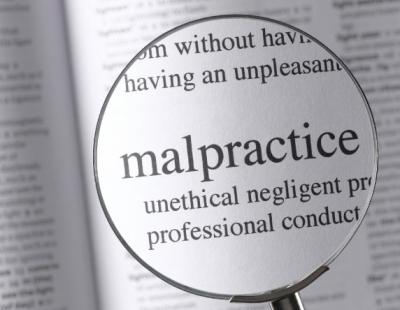 Nurse malpractice occurs when the actions of a nurse result in the injury of a patient. Nurse malpractice may occur in a nursing home, hospital setting, or even in a private residence if a patient is cared for by a visiting nurse. Depending on the situation, the institution that employs the nurse may be liable for damages incurred as a result of malpractice.
Nurse malpractice occurs when the actions of a nurse result in the injury of a patient. Nurse malpractice may occur in a nursing home, hospital setting, or even in a private residence if a patient is cared for by a visiting nurse. Depending on the situation, the institution that employs the nurse may be liable for damages incurred as a result of malpractice.
Types of Nurse Malpractice
There are many behaviors and actions that may constitute nurse malpractice, including:
- Medication errors
- Inadvertent injury of the patient
- Physical abuse
- Verbal abuse
- Neglect of patient needs
- Failure to report patient injuries
Proving Nurse Malpractice
To prove that nurse malpractice has occurred, it is necessary to show what duty of care was breached and how the patient was injured by the negligent or malicious actions. In order to be considered malpractice, the action must have caused harm to the patient. The harm must also be monetarily quantifiable. For this reason, it is much more difficult to successfully pursue a nurse malpractice claim involving actions such as verbal abuse or neglect than physical abuse or accidental injury.
Evidence and Testimony
In order to prove nurse malpractice, an expert is generally required to testify as to the normal standard of care that would be expected of a competent nurse in the given situation. Documentation of the injuries will also help to prove a malpractice claim. Medical reports, medical bills, and incident reports may all be helpful in proving that an injury actually occurred.
Nurse Malpractice Liability Floirda
Liability for nurse malpractice may vary depending on the circumstances. If a nurse acted in violation of company policy while attending a patient at a hospital, clinic, or in the patient’s home while administering home care, the nurse may be directly liable. If the act of nurse malpractice was performed while under the supervision of a doctor or while performing duties specified by the employing company or medical facility, the nurse may not be liable for the negligent action.
Doctor Liability
If a nurse was following orders given by an attending doctor when an act of negligence or malpractice occurred, the doctor may be directly liable. The doctor may also be liable if the nurse performed an act of malpractice, such as administering too much of a medication, while the doctor was supervising. Holding the doctor liable for the nurse malpractice may require proving that the doctor was in control of the situation when the act of negligence occurred.
Hospital or Company Liability
A hospital, medical facility, or home care company may be liable for nurse malpractice if the nurse was following company policies that caused harm to the patient. In some cases, this may cover scenarios in which a doctor and nurse worked together under the scope of company policy and an act of malpractice occurred. In order to hold a hospital or company liable for nurse malpractice, a victim may need to prove that the company was vicariously liable for the actions of the nurse. This can become quite complex, so it is recommended that an attorney provide assistance with proving that the company was liable.
Preventing Nurse Malpractice
Nurses may be able to help prevent malpractice by employing critical thinking and questioning orders or company policies that seem dangerous. Although nurses may take on liability by disobeying orders or violating policies, it is possible to circumvent unsafe situations by questioning certain actions. Patients and family members of patients may also help to prevent negligence or malpractice by staying informed regarding all aspects of care. Understanding medication doses and timing can help to prevent medication errors. Patient’s family members can help to identify and prevent negligence or abuse by visiting the patient often and asking questions about care.
Nursing Malpractice Attorneys Florida
If nurse malpractice is suspected, an attorney can be very helpful in determining whether the situation constitutes malpractice. If the situation meets malpractice criteria, an attorney can help obtain evidence and testimony to support the claim. Malpractice cases are often highly complex, so seeking assistance from a malpractice attorney ensures a greater chance of success when pursuing legal action for a malpractice claim.
Sources:
Croke, Eileen. “Nurses, Negligence, and Malpractice.” American Journal of Nursing 103.9 (2003): 54. Lippincott Nursing Center.com. Wolters Kluwer Health. Web. 24 Sept. 2014. <http://www.nursingcenter.com/lnc/journalarticle?article_id=423284>
Giordano, Kevin. “Examining Nursing Malpractice: A Defense Attorney’s Perspective.” Critical Care Nurse. The American Association of Critical-Care Nurses, 1 Jan. 2003. Web. 24 Sept. 2014. <http://ccn.aacnjournals.org/content/23/2/104.full>
“Nurses and Medical Malpractice.” Nurses Service Organization. Nurses Service Organization. Web. 24 Sept. 2014. <http://www.nso.com/pdfs/db/Nurse_SLCS_x-8540-510_final_web.pdf?fileName=Nurse_SLCS_x-8540-510_final_web.pdf&folder=pdfs/db&isLiveStr=Y>
